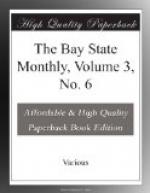After thus thinking over this interesting history of the old place, as I reclined under the shade of its trees, I was better prepared to enjoy the kind hospitality which it then offered me. I felt a peculiar pleasure in stepping into the same little front porch which Townsend Bishop had built so many years ago. And upon ascending the stairs I found myself lingering a while by the old original balusters, the building of which Roger Williams had perhaps viewed with interest. Upon reaching the attic it was a pleasure, indeed, to see in this new world the frame-work of a house which for two hundred and fifty years had stood so well the test of nature in all her moods. No saw was used in shaping those oaken timbers. They knew only the broad-axe. From this attic I descended to the sitting-room, to spend a while under the same low beams which had greeted the first visitors of the house. Here I imagined the Nurse family living in quiet and peace. Here I pictured the son Samuel, as, later, he wondered over and over again how he could remove the reproach which was on his mother’s name. And I thought that to him his descendants owed much, for it was mainly to his pleadings that the General Court exonerated her in 1710, and the Church in 1712.
While sitting there I learned of some alterations which had been made from time to time: how the front of the house, before which the old roadway used to be, had been widened by extending the western end beyond the porch.
As I came out of the house upon the green grass around it, I enjoyed again the grand outlook over the surrounding country,—the same which in the days of agony had strengthened human souls,—and then walked down the hill, by the family burying-ground, out through the entrance-gate into Collins street, the public thoroughfare.
I left the monument and its interesting associations that August day of 1885 (it was dedicated only the July 30 before) with the feeling that as the present descendants of Rebecca Nurse owe much to her son Samuel, so their future descendants will be indebted to them for the appropriate manner in which they have still further striven to vindicate before the world the innocence of a much-wronged ancestor.
* * * * *
THE PRESENT RESOURCES OF MASSACHUSETTS.
BY H.K.M.
Massachusetts is a busy state. The old time factory bell has not entirely given way to the steam whistle, nor the simple village spire to the more pretentious ecclesiastical tower of to-day, yet the energizing force of material prosperity has quickened the blood in nearly every hamlet, modernized the old, or built up a new, so that throughout the state there is a substantial freshness indicative of progressive thrift.




